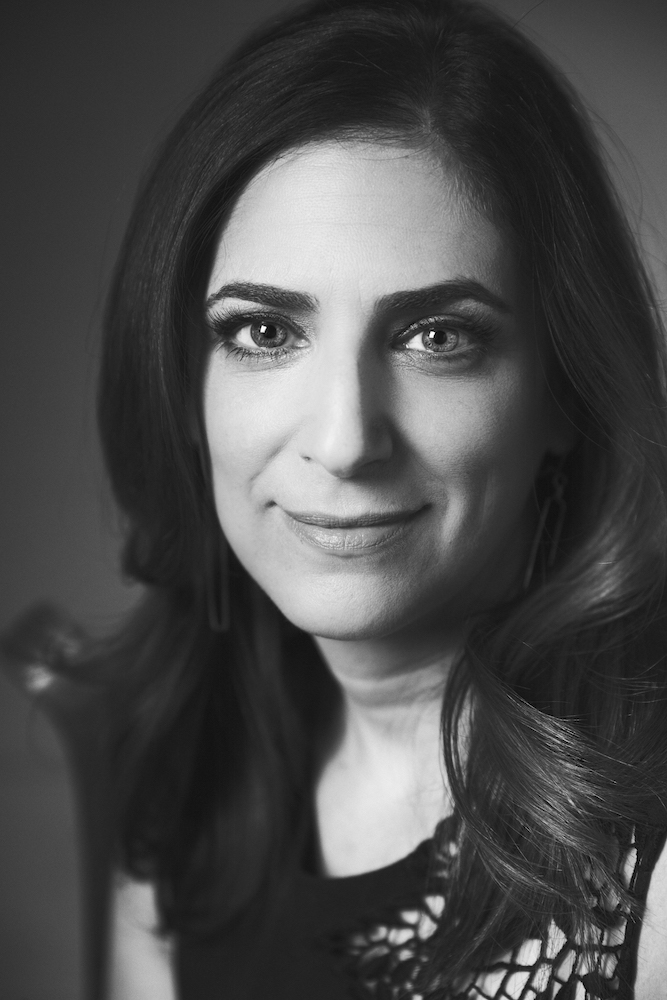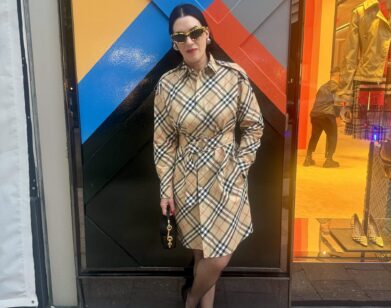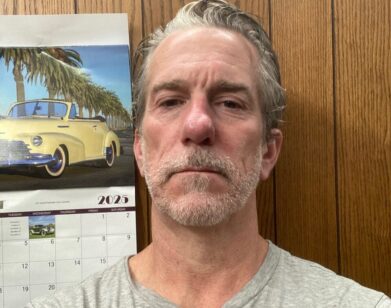Allison Amend and the Adventures of Mrs. Conway

ABOVE: ALLISON AMEND IN NEW YORK, APRIL 2016. PORTRAIT: FRANK SUN. HAIR: NAIVASHA JOHNSON/ EXCLUSIVE ARTISTS MANAGEMENT USING KERASTASE. MAKEUP: ELAINE MADELON/EXCLUSIVE ARTISTS MANAGEMENT USING SISLEY PARIS.
“You’re not allowed to read this—I’m not even really allowed to write it,” begins Enchanted Islands (Nan A. Talese) by writer and professor Allison Amend. Out today, Amend’s third novel is inspired by the memoirs of Frances Conway, an American woman who lived with her husband Ainslie on Floreana, a remote island in the Galapagos with a notable German population, during the lead up to World War Two. From Conway’s descriptions of quotidian life on the island, Amend draws a rich, fictionalized backstory that is at once a coming of age tale, a historical thriller, and an examination of love, identity, and fulfillment.
Not much is known about the real Frances Conway, but Mrs. Conway-the-character was born in 1882 to Jewish Polish immigrants in Duluth, Minnesota. From a nursing home in 1964, she remembers how she fled to Chicago with her best friend Rosalie as a teenager, lied about her age to get a job at a socialist newspaper printing press, and changed her name from Frankowski to Frank to disguise her Jewish heritage. We learn about Rosalie’s aspirations to become a famous actress and Frances’ first boyfriend. We don’t reach Floreana until a third of the novel has passed. Frances is a fifty-something, unmarried teacher in 1930s San Francisco; in the eyes of the society around her, her life is effectively over. Then she meets Ainslie and becomes a spy.
Born and raised in Chicago and currently based in New York, Amend studied comparative literature at Stanford University and attended the prestigious University of Iowa Writers’ Workshop. She released a short story collection in 2008 and her first two novels, Stations West and A Perfect Copy, in 2010 and 2014 respectively.
EMMA BROWN: How did you first come across Frances Conway’s memoirs?
ALLISON AMEND: I was looking for a new book project; I had just turned in my previous novel. I’ve always wanted to write about the Galapagos. I had been there as a 19-year-old with my parents, and it was an amazing place. I fell in love with this memoir this woman had written about the late ’20s and early ’30s on the island of Floreana. There was a series of murders there that had never been solved. It’s unclear what happened; people disappeared. I wanted to write a book about that but some of the descendants are still alive and they actually made a wonderful documentary about it called The Galapagos Affair: Satan Came to Eden. So I was like, “That subject’s been covered and is a little sensationalistic, where is there a story for me?” I was reading other accounts of the time and I came across the memoirs of Frances. I had to order them on the internet because they had been out of print for years. I found some obscure edition from the ’50s in London—thank you, internet. I read her book and I just loved her voice so much. She was funny and self-deprecating and described things so beautifully and made the uninteresting interesting. I was also really fascinated by what she didn’t say; there was so much between the lines in terms of her relationship with her husband and why they were there and what she really thought about what was happening. That felt like the space I needed to write a book.
BROWN: When Frances first arrives on the island she mentions a former resident named Doctor Ritter and his wife.
AMEND: Those are based very loosely on the real doctor who lived there with his wife.
BROWN: And the doctor mysteriously disappeared.
AMEND: He was a vegetarian; they both had all their teeth pulled before going to Floreana. They knew they were most likely to succumb to some sort of dental problem, and why would you need teeth if you’re a vegetarian? He actually died of meat poisoning. They had meat for their chickens. It was a drought and he was very hungry, so he ate it. There’s a suggestion that maybe his wife poisoned him or that maybe someone else on the island poisoned him. So the Ritters are based very loosely on him, though Frances Conway and Doctor Ritter never lived at the same time on the island.
BROWN: Was there really a German presence on Floreana?
AMEND: There was a very strong German presence. It fluctuated who was there when, but at any given time there were seven to 10 Germans on the island and then Frances and her husband Ainslie.
BROWN: In Frances’ memoirs, did she mainly describe: “This is what I cooked today and this is whom I talked to”?
AMEND: They did very little talking. It was a lot of, “This is what I cooked.” But if everything you cook has either been foraged or grown by your own two hands, “how I cooked this” can be 30 pages. She has a way of making her adventures kind of fun, like the time the donkey stole her curtains. Some of those funnier episodes I adopted for the book. Also the hardships they encountered: how to start a fire, how to keep a fire going, how to keep the ants out of the sugar. People would come and visit and that would punctuate the boredom. She did say it was very tedious on the island a lot of the time—no one to talk to.
BROWN: Can you still go to Floreana today?
AMEND: Yes. I went a year ago to do some research. You can see where she lived with Ainslie. It’s very jungle-y there, that part of the island, so it had been overgrown, but I met the man who owns the land now and he took me up there to show me where it was. I got a sense of what it looked like, what it smelled like, what it sounded like, what it felt like up there.
BROWN: When Frances and Ainslie arrive, they just plop down on a piece of land and sort of claim it.
AMEND: Yeah. The [islands] were nominally owned by Ecuador, but everyone thought they were uninhabitable islands because of the lack of fresh water. You could eek out an existence there. Now there are about 200, 250 people who live there, which is really small. They mostly farm.
BROWN: Have they been there for more than one generation?
AMEND: There are about a dozen people who have been there for more than one generation. Everyone else is a recent immigrant. They’re mostly farming and eating what they farm and then feeding the other islands off of that food too. The islands are all so different from each other, and Floreana is it’s wet and high, so you can grow fruits and vegetables.
BROWN: Frances was born in 1882, and with the turn of the 20th century she witnesses so much, which you talk about in the book.
AMEND: Especially those 100 years. She’s about 30 years older than my grandparents were, but just the amount both social and industrial change that the world went through is more than any other time period that I can think of in the history of humanity. How disorientating must that be for some people? I see how disorientated my parents are by the internet, and I can only imagine if everything in the world had changed so utterly from the time you were a child how out of sync you would feel with the world. I think that adds to Frances’ feelings of not necessarily fitting in in any one place.
BROWN: Ainslie has a secret. Is that something you decided would be part of his character straight away?
AMEND: Yeah. I have no evidence—there’s actually almost no historical record of either of them. I have where they’re buried and I have Ainslie’s draft card and I could find nothing else on them. But it felt very much that there was something Frances wasn’t saying about their marriage. One thing I did pick up on that actually was true—she never says it in the book—was making Ainslie an alcoholic. When I went to Floreana to talk to the family who owns the land there, the man said, “Oh yes, I talked to my great uncle and he said that his mother had told him that the Conways were alcoholics and they’d come to the island to dry out.” So I somehow picked that up, even though it’s never stated. I felt like they were both hiding something, and that turned me onto Ainslie’s secret and Frances hiding her Judaism.
BROWN: Frances is searching for this all-fulfilling love and she never finds it in one place. Were you ever tempted to give it to her as a character you created and are fond of?
AMEND: Yes. I did really want good things for Frances, and I think with everything in her life, when you put it together, it’s a satisfying and loving and fulfilling life. I think that is how a lot of people live and find their lives; there’s no one person who gives you everything but you take a bit from everybody. The book ends where it starts, in the old folk’s home, and I think she’s pretty content all in all. But it’s hard to watch characters make bad decisions, and it does feel very much like watching. Even though I’m writing her and I could easily make a Hollywood agent discover her and she’s a big cinema star, it feels very much likes she’s making these decisions, and I want to be like, “Frances, don’t!” It’s always hard to watch. You feel bad for her.
BROWN: Frances could have had so many lives throughout the book; she could have married her first boyfriend in Chicago. Did you think about that at all?
AMEND: Yeah. There were a few false paths that I took where maybe she was going to meet up with Rosalie earlier or maybe she was never going to see Rosalie. There’s a whole section I cut out of when she was 16 to 40. They exist, but it didn’t seem to fit in with the book as it was when I finished it, so I took it out. There are a thousand ways this book could have gone.
BROWN: Does it feel that way generally when you write—that there are endless options? Or does it feel like, “This is the way it’s going.”
AMEND: It feels very much like “This is the way it’s going” until you hit, not even a fork, but a branching out and there are 1000 different paths you could possibly take. Then you have to stop and take stock and you never know which one’s the right one until you start down the path. It does feel very much like you’re going, you’re going, you’re going, and then suddenly, “Uh oh, I don’t know what happens next.” That’s a really scary time when you’re writing because you have all this great momentum and suddenly you’re floored. What I’ve learned in the few books that I’ve written so far is that you just have to pick a path and go, and if it’s the wrong path, that’s one less path you need to try.
BROWN: With your other two novels, did you start with the subject that you wanted to write about as well? What was the genesis?
AMEND: With A Nearly Perfect Copy, I was very interested in the idea of art forgery, and how when you copy a painting, you don’t literally copy the Mona Lisa, no one would believe you, but you copy something related to it—a sketch, an unfinished painting. And the ways in which when you clone something—like Dolly the sheep—you don’t get the exact replica because obviously it’s growing up in different circumstances. Those two things running parallel—the idea of copying and not getting an exact copy—were very interesting to me, so I sort of wrote it around that. My first novel I wrote on sort of a lark because it seemed so funny. It’s about Jewish immigrants in Oklahoma in the 1800s. I was reading this book that I found in my grandfather’s study about a Jewish cowboy who was living in Oklahoma, so I wrote a short story and then everyone kept encouraging me to turn it into a novel. I never expected to spend that much time in 19th century Oklahoma.
BROWN: Once you have your theme, is it easy to find a protagonist?
AMEND: I think the theme and the protagonist appear somewhat simultaneously. I’m working on a new book now, it centers around a hate crime that occurs. It seemed very obvious to me that I wanted someone close to it but not in it, so the ex-wife of the person who it happens to is the protagonist—how she would feel about being close to such a horrific crime and how that would affect her. That was the genesis of the book so far.
BROWN: Is your family quite creative? Was being a writer a feasible goal for you growing up?
AMEND: My father’s a lawyer and my brother’s a scientist, but we were definitely told that we were very special, we could do whatever we wanted. I always wanted to be a writer since I was, like, a third grader and no one ever told me I couldn’t be.
BROWN: Were you writing stories all the time when you were little?
AMEND: Yeah. I was taking piano lessons and I hated piano so much because I’m terribly unmusical, and so I would take the books where you were supposed to write down the notes and write stories in them so that there wouldn’t be room for music. Plus I really like the clefs as a way to write stories. I thought that was really fun. But they still made me take piano for years.
ENCHANTED ISLANDS COMES OUT TODAY, MAY 24, VIA NAN A. TALESE.






